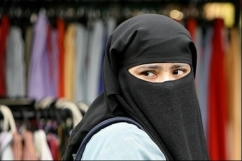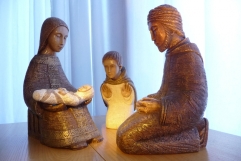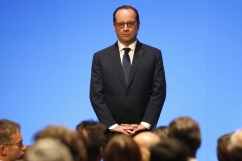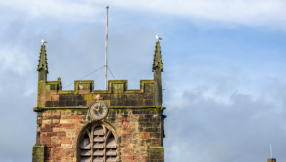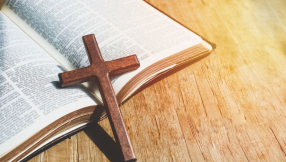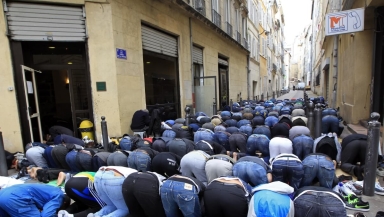
A controversial proposal by a Muslim leader in France earlier this month to turn the nation's empty churches into mosques has sparked fierce opposition – an online petition quickly gathered 40,000 signatures. But while many Christians may quail at the prospect of the familiar landmark of a French village church suddenly being replaced by a minaret, springing to the defence of such buildings with a cry of "hands off my church!" – as the opponents have – runs the risk of missing the point.
For one thing, since the separation of Church and State in France in 1905, the vast majority of historic church buildings have in fact been owned by the public authorities – at the end of the day, it's up to them, not the Church, to decide what to do with disused, deconsecrated buildings.
The second point to bear in mind is that many of these empty edifices are in rural France – not really where demand for mosques is high. Disused churches in urban areas are more likely to be demolished and replaced by residential buildings than taken over by new congregations of any faith.
Moreover, if a historic, empty church building doesn't fall prey to developers, chances are that it's listed. That severely limits what can be done with it, both internally and externally. One evangelical church I know recently took over a former Catholic church – and discovered just how hard it was to comply with the strict 'historic monument' requirements, in everything from stained glass windows to repointing; so just imagine the challenge of turning it into a mosque!
In short, the prospect of steeples being swapped for minarets across the land is a bit far-fetched; Muslims would doubtless prefer more functional facilities, located where they need them.
But while the suggestion of turning old churches into mosques nationwide may have been a rather cheeky one, it does raise a serious point: the lovely church buildings dotted across France don't really reflect today's religious realities. We may appreciate the architecture, but the spiritual context that put it there is clearly a thing of the past – as is only too evident by the number of disused places of worship, and the growing Muslim presence.
So the real issue is not the hijacking of architectural or cultural heritage, but recognition of the cultural and religious landscape in France today. Peaceable Muslims are everywhere, but largely ignored (the secular French Republic doesn't collect statistics on religious affiliation as a matter of principle). They are invariably pushed to the margins, not only socially but also, in many cases, geographically – for instance, to the low-income banlieue estates surrounding central Paris and other large cities. The semi-serious bid for empty churches neatly encapsulates the need of France's Muslims for better public visibility.
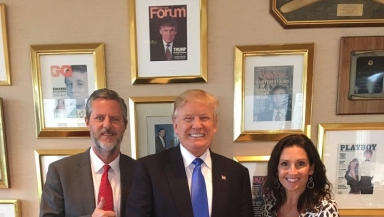
In France, Muslims are virtually absent from public office and other high-profile positions. On Fridays, in some places they pray in the streets or in cellars, to much popular consternation – because there's nowhere else for them to meet. I'm convinced that the lack of physical, cultural and social space given to Muslims here is a contributing factor to Islamic radicalization; given the prevailing constraints, it's so much easier to become radical than respectable!
Indeed, France has long tended to impose secularism: a strict, anticlerical relegation to the private sphere of all things spiritual; all religions have suffered as a result. It's a far cry from the original French concept of 'secularity' (laïcité). Championed notably by Protestants, the idea behind the 1905 law separating Church and State was not to stifle religion, but to untangle it from government and provide a level playing field for those of all faiths and none.
However, the tide may now be turning against rabid secularism. Amid dwindling public resources, increasing social inequalities, and the tangible threat of terrorism, my sense is that the French state is warming once again to its original brand of secularity, allowing 'faith-based' entities to play a legitimate role in the public sphere. As well as being a good thing for Christians, this could offer a way forward for moderate Islam in France, and help mitigate extremist tendencies. Peaceable Islam is a faith practised by many here. It deserves to benefit from secularity, and should be positively encouraged to inhabit public, social space; facilitating the provision of suitable premises in which Muslims can worship would be one good move in this direction.
That probably won't eliminate terrorism overnight, nor will it solve the various internal divisions among France's Muslims. But practical steps need to be taken to make people more aware of the multi-faith reality in France today, and to uphold the very best in the concept of laïcité. Islam needs room to modernize and find a place in contemporary society, instead of being consigned to the fringes. Encouraging it to do so could also give greater religious freedom to everyone, Christians included – and doesn't have to involve repurposing Notre Dame as a mosque.
David Buick pastors independent church Christ Pour Tous ('Christ for All') in Rennes and has served as protestant chaplain in Rennes men's prison since 2003 – where those of several faiths, including Muslims, share the same worship space.










